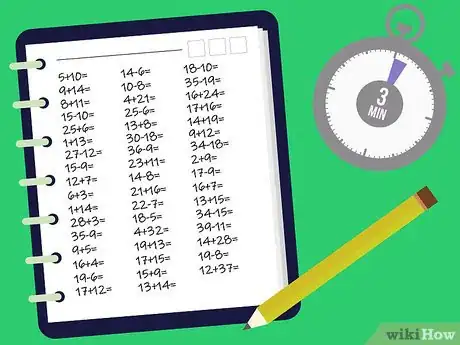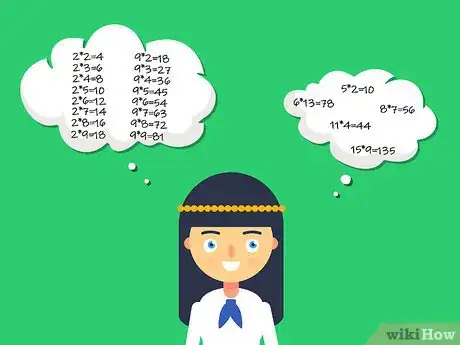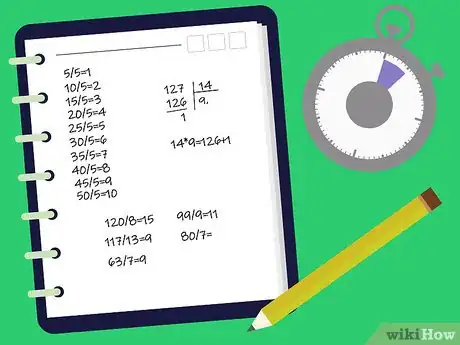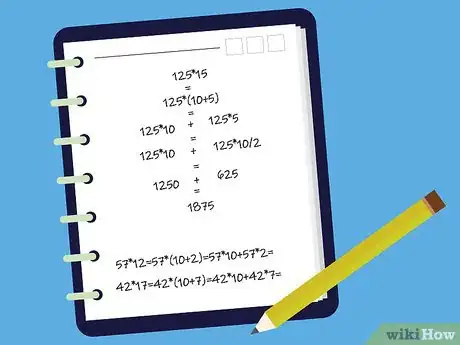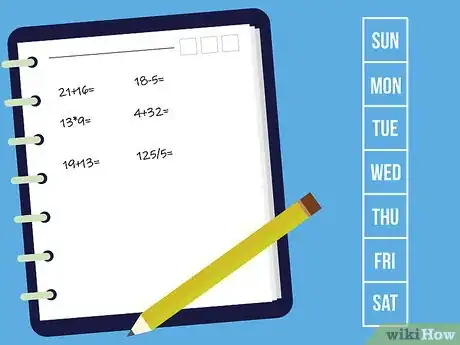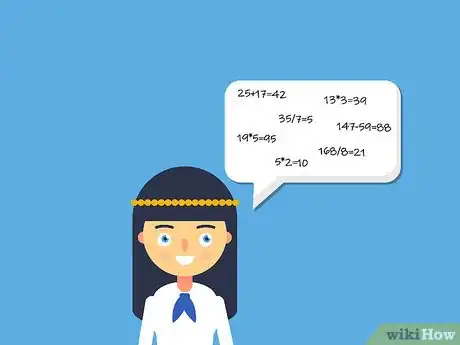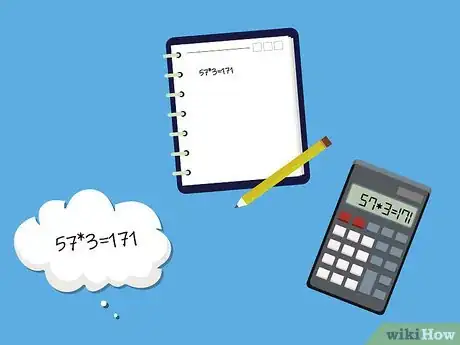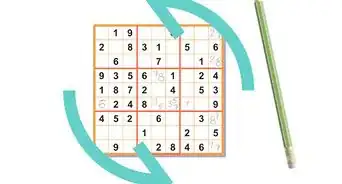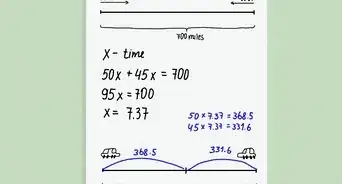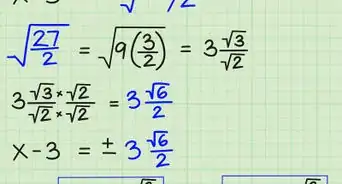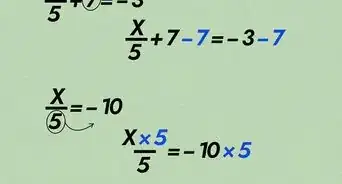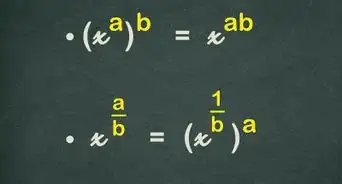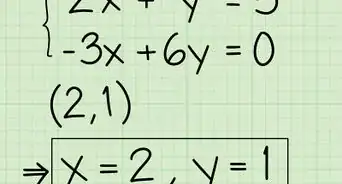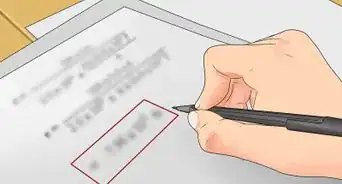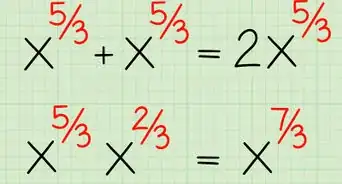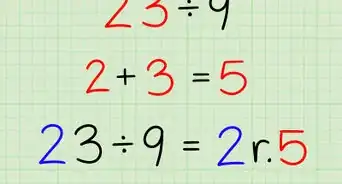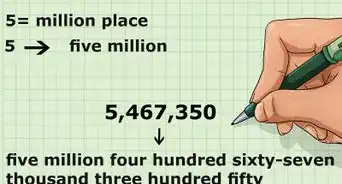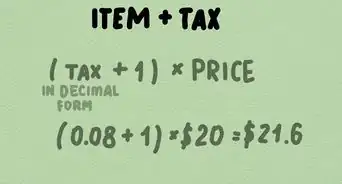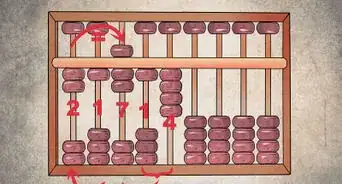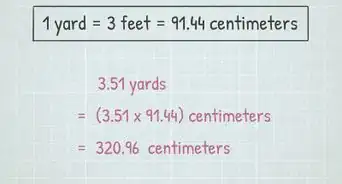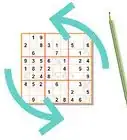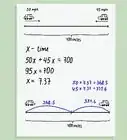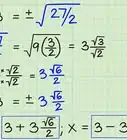This article was co-authored by Soren Rosier, PhD. Soren Rosier is a PhD candidate at Stanford's Graduate School of Education. He studies how children teach each other and how to train effective peer teachers. Before beginning his PhD, he was a middle school teacher in Oakland, California, and a researcher at SRI International. He received his undergraduate degree from Harvard University in 2010.
wikiHow marks an article as reader-approved once it receives enough positive feedback. In this case, 94% of readers who voted found the article helpful, earning it our reader-approved status.
This article has been viewed 396,550 times.
Mathematical calculations come up frequently in day-to-day life, and there is a lot of benefit to being able to tackle a problem without resorting to a calculator. Whether you’re short for time in an exam or just calculating the tip at a restaurant, working on your calculation skills is a beneficial way to expand your memory and keep your mind sharp!
Steps
Practicing the Fundamentals
-
1Do speed addition and subtraction tests. The more you work with the numbers themselves, the quicker you will recall how they work together. Start back at simple addition and subtraction to ensure the fundamentals are solid.[1]
- You can find speed tests online or in your local school supply store. Typically, there will be 50 problems on a single sheet that you will work through.
- Work as fast as you can to finish and then go back to check your work. The worksheets should take you less than 3 minutes per test page. Set a timer to stick to the 3-minute limit.
- Aim for accuracy above time, but eventually you will only to have to focus on how fast you can get the right answer out.
EXPERT TIPSoren Rosier is a PhD candidate at Stanford's Graduate School of Education. He studies how children teach each other and how to train effective peer teachers. Before beginning his PhD, he was a middle school teacher in Oakland, California, and a researcher at SRI International. He received his undergraduate degree from Harvard University in 2010.PhD in Education Candidate, Stanford University
 Soren Rosier, PhD
Soren Rosier, PhD
PhD in Education Candidate, Stanford UniversityThese basic skills will help you with more difficult math later on. PhD candidate and former teacher Soren Rosier says: "When you practice, these answers become automatic. Then, when you get into higher level math, you can spend less time thinking about calculations, so you can think more about the conceptual aspect of a problem."
-
2Memorize multiplication tables up through 15. Usually, in elementary school, you are required to memorize the multiplication tables from 0-10. Practice those again, adding in 11-15. Knowing that many multiplications by memory alone will speed up your calculations significantly. You should also learn tricks.[2]
- Rather than finding multiplication tables to print out, create your own. The practice of writing the table out will start to work the numbers into your memory even sooner. Write them out at least 7 times before sticking to 1 of your sheets to study.
- Keep working on the tables until you just remember what 6 x 13 is, for example. You should not have to work out the math for any of the 256 combinations.
- You can find multiplication speed tests similar to the addition and subtraction ones as well online and in school supply stores. After reviewing the tables sufficiently, work up to the timed tests.
Advertisement -
3Recall your multiplication tables for division. Try some division speed tests next, using the recall of your multiplication tables to find your answer. Just as you shouldn’t have to work out the math for division involving 0-15, you should just match the right answer to the combination of numbers presented.[3]
- Having this type of recall will also help you to recognize when a number won’t be evenly divisible. For example, you might see 127 / 14 and remember that this is almost the even division of 126 / 14 = 9. Since the numerator is slightly off, you will know to resort to working out the problem.
- Knowing that 127 is larger than 14 x 9 will help you to immediately realize that the answer is going to be slightly larger than 9!
Using Other Methods to Calculate
-
1Simplify calculations into smaller, easier calculations. For example, if you are multiplying 125 x 15, you can break this up into two component parts (factoring out, essentially). First, multiply 125 x 10 (1250). Second, divide that answer by 2 (625). Now add both numbers together (1250 + 625 = 1875).[4]
- Instead of dealing with writing down the multiplication and work right-to-left, you can realize that you’re looking for 125 x (10 + 5) = (125 x 10) + (125 x 5) = (125 x 10) + (125 x 10 / 2).
- By breaking the problem down to one simple calculation of 125 x 10, one division by 2, and one addition, you avoid a trickier multiplication.
- Always look for ways to use simpler calculations or memorized multiplication tables, for instance, to simplify a harder calculation.
- Understanding these component parts can then be applied to leaving a 15% tip, for example, and all you have to do is move some decimal places afterward.
-
2Do a few small calculations at least once a day. Practicing is the best way to keep your mind sharp when it comes to mathematical calculations. Work on different types of problems each day: word problems, percentage problems, long division, decimal calculations, etc.
- Challenge yourself to work on areas that you notice you struggle in. If fractions tend to give you a hang up when calculating, spend a week or two just doing fraction calculations.
- Even just looking at multiplication tables or worked out problems is beneficial. Eventually, you will start to notice patterns and new ways to deconstruct problems you didn’t see before.
-
3Vocalize your mental process to yourself. Saying the numbers and process out loud will make you hear the calculation as you work it out, too. This adds a new layer of learning and memorizing on top of what’s already there.[5]
- Hearing yourself say a number creates another mental copy of the number in your working memory. With an auditory and visual copy of the number, it becomes easier to recall as you’re calculating.
-
4Try to do as much in your head as possible. Once you’ve done a calculation in your head, do it with pencil and paper. See if you have the same answer. Now, consult a calculator to check the answer once and for all.[6]
- Although fingers can be a quick way to hold a number aside during a calculation, try to rely on the visual memory or even auditory memory instead.
- Testing yourself by not relying on a calculator or even writing the numbers down will help with your working memory, number recall, and even visual/spatial skills.
Community Q&A
-
QuestionHow do I improve my math exam scores?
 Community AnswerPay attention in class, talk to your teacher if you are confused, identify your weaknesses and create a study plan to improve them. When taking exams, read each question carefully and double-check your work.
Community AnswerPay attention in class, talk to your teacher if you are confused, identify your weaknesses and create a study plan to improve them. When taking exams, read each question carefully and double-check your work. -
QuestionWhat can I do if I don't remember things well?
 Community AnswerIt will just take you a little longer to learn it. The more you practice, the better you will know the material. Use flashcards, ask someone to quiz you or make up problems for you, and ask a friend or the teacher for extra help if you need it. Remembering things is all about repetition, so just keep at it.
Community AnswerIt will just take you a little longer to learn it. The more you practice, the better you will know the material. Use flashcards, ask someone to quiz you or make up problems for you, and ask a friend or the teacher for extra help if you need it. Remembering things is all about repetition, so just keep at it. -
QuestionWhat is the square root of 10?
 Community AnswerThe square root of 10 is 3.16.
Community AnswerThe square root of 10 is 3.16.
References
- ↑ https://education.jlab.org/smadd/
- ↑ https://www.mathsisfun.com/tables.html
- ↑ https://www.manhattanprep.com/gmat/blog/2012/05/09/everyday-ways-to-improve-your-mental-math-skills/
- ↑ https://www.mathsisfun.com/multiplication-tips-tricks.html
- ↑ https://guides.lib.uoguelph.ca/MathWithoutCalculator
- ↑ https://www.ldatschool.ca/evidence-based-interventions-for-math/
About This Article
To improve your mathematical calculation skills, memorize the multiplication tables up through 15, which will make doing calculations in your head a lot easier. Also, try to regularly take speed addition, subtraction, and division tests online so you can get faster and faster at them. You can also do a few small calculations a day to put what you're learning to use. Just try to do them in your head before you break out a pencil and paper or a calculator. To learn how to simplify calculations so they're easier to do, scroll down!
